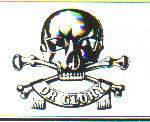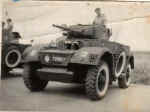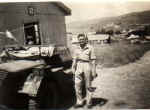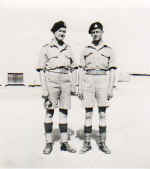StablesHistory.co.uk
The Definitive History of the Surname
STABLES in Yorkshire
| ||||||
The Autobiography of Brian Stables (Part 6) |
|
Introduction |
Teen Age |
| This is the sixth
part of Brian Stables's fascinating and very funny autobiography, which
is written in his own words.
Brian was born in Tickhill in 1929 and emigrated to Canada in 1976. He is currently serialising his life story for us. He has also provided a superb collection of photographs to accompany his story. Click the photo for a larger image.
|
When
I compare my years between twelve and twenty
with that of the generation of the 1990s I am struck, as I am sure other
generations have always been struck, by the large difference in the way
life is perceived to be as one generation succeeds another. I, I regret
to relate, was involved with learning how to destroy things and kill
people. Times, as they say, were different.
One of the final things I learned at school was how to dance, the headmaster’s wife ran ballroom classes, and of course, anything to get close to a girl was right up my street. Mrs H. liked to use me as a partner to demonstrate the moves, I wanted to get close to the girls of my age, but there I was, gasping for air, clasped into the ample bosom of this rather large flamboyant lady, I appreciated it later as it gained me some popularity with the girls after the lessons. The overwhelming influence of those years was undoubtedly WW2. I was too young for the regular forces but I joined the Army cadet force and received training from the members of the L.D.V., or the Home Guard, as it became later. It was from these veterans of the First World War that I learned the most important rule for my subsequent life; “Disregard all government propaganda”. These men had been subject to the worst kind of brain washing, and they were determined that we youngsters would not be hoodwinked too; they taught us that the German people were as much victims of circumstance as we were, this was not to say that we should feel sorry for them, nor indeed, to relinquish our desire to protect our homeland They also taught us how to survive in the event of an invasion and how to conduct a guerrilla war in England. It was felt that, in the event of a successful invasion by Adolph and company, the men would be taken away and we kids would have to pick up the fight. It was exciting to learn how to shoot and to throw grenades, how to make real ‘Molotov Cocktails’, (as opposed to petrol bombs,) how to blow up railway lines and bridges, how to sabotage motor vehicles and generally play havoc with the establishment. They also, thank God, taught us responsibility, and demonstrated how everything we did would affect others; it was a wonderful life for a young boy like me. I was almost disappointed that the invasion did not materialise! I left there to go to a smaller place in Bessecar and from that went to join the Army. I swear a man with a wooden leg could have passed the physical examination When I left school, at fourteen, I started work at a garage opposite the Railway station in Doncaster, where, after I had cleaned the workshop, I was shown how to drive and how to repair and maintain motor vehicles; the company had a contract to refurbish RAF cars and vans from the adjacent airfields. Again I was under the influence of WW1 veterans. I left there to go to a smaller place in Bessecar and from that went to join the Army. I swear a man with a wooden leg could have passed the physical examination; someone stuck a watch in my ear and asked if I could hear it, another asked if I could see a sign stuck on the far wall, as it was two foot high and read; ‘NO SMOKING’ I acknowledged I could, and so it went. Through my time in the cadets I had gained qualifications which allowed me to skip basic training and go direct to the ‘passing out’ tests, these were no problem to me as I was already a qualified instructor on small arms etc. I was back home on two weeks leave just a week after I joined up, Mum thought I was AWOL and had a fit. I was transferred to Barnard Castle for further training in the Royal Armoured Corps; again, I was ahead of the game, and needed only basic instruction in driving AFVs, this being my sole ambition, for I had decided that the infantry idea of walking everywhere was not for me. I remember my girl friend's mother ‘reading’ the dregs of my tea cup and bursting into tears, the recollection of which did little to buoy my spirits as I packed my gear in preparation to board ship. When it came time for my posting to a Regiment both my current girl friend and my mother became agitated in case I should be posted to Palestine, a place that was currently very much in the news as being unhealthy for British troops. I denied that there was any possibility of this, after all I was still under age, (doubly so, as I had falsified my age upon enlistment,). Whilst on embarkation leave prior to my posting to Egypt I remember my girl friend's mother ‘reading’ the dregs of my tea cup and bursting into tears, the recollection of which did little to buoy my spirits as I packed my gear in preparation to board ship. Whilst waiting to board the troopship and standing on the floating pier of Princess Docks in Liverpool I was overcome by seasickness, as can be imagined this created no small amusement in those around me. I had my revenge when we hit open water, for by then I was over it; they suffered for quite a lot longer than me too. After calling in at Gibraltar, Malta and Port Said we passed through the Suez Canal to a large military depot close to Ismailia on Lake Timsah, just north of the Great Bitter Lakes. My first indication of how bigoted and racially prejudiced were my fellow Englishmen, came about on a sightseeing trip to Cairo. We were standing on a high balcony, overlooking a huge marketplace which was teeming with people and animals of all sorts, when one of my fellow soldiers spoke those well remembered words; “Cor, look at all them blankety Wogs”. ...the distant hills to the East were spectacular. I think I would have enjoyed it more if people had not been so anxious to kill me. As a qualified armoured car driver, and the 17th/21st Lancers being currently equipped with Daimler armoured cars, I was posted to Palestine. We were a group of six who travelled by rail and army truck up to Tiberius, a town on the Sea of Galilee; our camp was at the edge of town straddling the main road, about half way up what appeared to be an escarpment, next to a civil police fort, in fact, we were actually below sea level, although you would never know this from the truly magnificent views of Galilee spread below us, the distant hills to the East were, (are,) spectacular. I think I would have enjoyed it more if people had not been so anxious to kill me. Naturally, the Regiment had no requirement for drivers, but they were desperately short of wireless operators, a skill of which I knew nothing. I joined a training class and began to learn how to operate a wireless set and communicate in the Morse code. The instructor was a Cpl Ron. Brown, (he later became a Lt/Col.,) a natural leader with an intelligence that seemed out of place somehow. I was about three quarters of the way through the course when some excitement started up on the Northern border and due to the shortage of qualified operators, I was whisked away to take a more active role at being a soldier. I was doing just fine until we had to quell a problem and I was expected to shoot the gun. I should explain; there are three crew members, Commander, Driver and the wireless operator/gunner. No one had thought to ask if I knew how to fire the guns. I was OK with the wireless and machine gun, but the main armament was new to me, this was a bit unfortunate, and I had to receive instruction ’on the job’ so to speak! The poor car commander, a young subaltern, was a bit nonplussed, but, in good cavalry manner, he rallied round and, stabbing his finger at the different controls had me banging away in no time. I had some incentive to learn swiftly! I never did get back to finish that course, but Ron passed me anyway. It was a peculiar posting; here I was in the most Holy places of three great religions, and everyone was going around killing each other, they still are even as I write this, (2003). What aggravated me was the restriction to study any of it without taking precautions against attack. I travelled all over the country, for it was discovered I had a natural ability in using the short wave radio and good operators were in high demand. Interestingly, the radios I got were mainly marked in Russian script, so it was as well I knew what the different controls were for. We lost a lot of sleep and worked hard, we came under the influence of some of the best senior NCOs in the world; they were mainly old soldiers who had served as (horse) cavalrymen in India in the ‘thirties, they had fought in tanks through North Africa and Italy during WW2, then became involved in the troubles with communists in Greece, after which they came to Palestine, they were experienced and looked after us youngsters as if we had been their own sons. I came to understand that discipline in the Lancers was achieved by leadership, if you were unable to lead the men to act in the correct manner without threats or bullying, you were considered unfit to hold any rank at all. I later learned that if one were to use a ratio of weeks in combat during WW2 and the weeks in Palestine, our Regimental casualties were heavier in Palestine. This included my best friend who was shot and killed. I was out on patrol at the time and had left some personal items with him; they were packed up and sent to his widow, I did wonder what she thought of the religious books, she must have thought Joe had taken a new direction; I like to think it gave her some comfort but I doubt it, as they were not all to do with the Christian faith. I was obliged to seek women who were mature enough to have money to spend, these were almost invariably married, but lonely! We embarked at Haifa, for me; once again in the Cunard troopship ‘Samaria’, we did a tour of the Mediterranean Sea with calls at Piraeus, Malta, Gibraltar landing at Liverpool. I remember an article in a newspaper at the time remarking in the fact that this was the first time the ‘Jolly Roger’ had been flown by any ship whilst travelling down the river Mersey. Our Regimental flag being a skull and cross bones! Upon my return home I was a changed man, my girl had already sent me the (obligatory?) ‘Dear John’ letter and I was anxious for some female company and booze. I indulged in both - to excess. Looking back, I think it was a kind of D.I.Y. therapy, and, from what I remember of it, I admit it was an enjoyable time. The army was vastly underpaid, four shillings a day plus ‘trade’ pay of sixpence per qualification so I was obliged to seek women who were mature enough to have money to spend, these were almost invariably married, but lonely! My reaction to my recent experiences, plus my natural affinity for rebellion, was not a good mix and I was lucky I was not in a ordinary Regiment, instead of punishing me for transgressing army regulations however my squadron sergeant major placed me as mess servant in the sergeants mess bar, I had to be on duty six days, (and nights,) a week and this, as he knew it would, cramped my attractiveness to the ladies, then, when I was suspected of being with one of the senior ranks girl friends on my night off, (guilty,) another one of the SSMs ordered me to join the R.A.O.B. (Royal Antediluvian Order of Buffaloes,) and he made sure I attended lodge every time I had time off! Need I say I did manage to sneak away most afternoons? Where there is a will, there is a way! As my teens ended I was stationed in Catterick camp, Lance Corporal in charge of cleaning the squadron latrines. Read the next installment: Twenties |
 Motto and Emblem, 17-21 Lancers |
|
 Brian Stables, Palestine, 1948 |
|
Send mail to Michael Chance & Andy Stables at
enquiries@stablesfamily.co.uk with questions
or comments about this web site.
|


